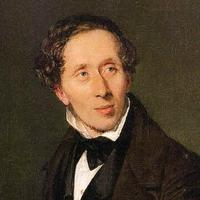The Bell, part 2
The sun was shining gloriously; the children that had been confirmed went out of the town; and from the wood was borne towards them the sounds of the unknown bell with wonderful distinctness. They all immediately felt a wish to go thither; all except three. One of them had to go home to try on a ball-dress; for it was just the dress and the ball which had caused her to be confirmed this time, for otherwise she would not have come; the other was a poor boy, who had borrowed his coat and boots to be confirmed in from the innkeeper's son, and he was to give them back by a certain hour; the third said that he never went to a strange place if his parents were not with him--that he had always been a good boy hitherto, and would still be so now that he was confirmed, and that one ought not to laugh at him for it: the others, however, did make fun of him, after all. There were three, therefore, that did not go; the others hastened on. The sun shone, the birds sang, and the children sang too, and each held the other by the hand; for as yet they had none of them any high office, and were all of equal rank in the eye of God.
But two of the youngest soon grew tired, and both returned to town; two little girls sat down, and twined garlands, so they did not go either; and when the others reached the willow-tree, where the confectioner was, they said, "Now we are there! In reality the bell does not exist; it is only a fancy that people have taken into their heads!" At the same moment the bell sounded deep in the wood, so clear and solemnly that five or six determined to penetrate somewhat further. It was so thick, and the foliage so dense, that it was quite fatiguing to proceed. Woodroof and anemonies grew almost too high; blooming convolvuluses and blackberry-bushes hung in long garlands from tree to tree, where the nightingale sang and the sunbeams were playing: it was very beautiful, but it was no place for girls to go; their clothes would get so torn. Large blocks of stone lay there, overgrown with moss of every color; the fresh spring bubbled forth, and made a strange gurgling sound.
"That surely cannot be the bell," said one of the children, lying down and listening. "This must be looked to." So he remained, and let the others go on without him.
They afterwards came to a little house, made of branches and the bark of trees; a large wild apple-tree bent over it, as if it would shower down all its blessings on the roof, where roses were blooming. The long stems twined round the gable, on which there hung a small bell.
Was it that which people had heard? Yes, everybody was unanimous on the subject, except one, who said that the bell was too small and too fine to be heard at so great a distance, and besides it was very different tones to those that could move a human heart in such a manner. It was a king's son who spoke; whereon the others said, "Such people always want to be wiser than everybody else."

